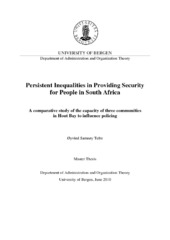Persistent inequalities in providing security for people in South Africa - A comparative study of the capacity of three communities in Hout Bay to influence policing
Master thesis
Permanent lenke
https://hdl.handle.net/1956/4180Utgivelsesdato
2010-06-10Metadata
Vis full innførselSamlinger
- Department of Government [473]
Sammendrag
Despite the hopes of the people in South Africa that the new democracy would bring significant changes to the many impoverished people in the country, this has not happened. In relation to security, crime has risen to the top of the national agenda and is the focus of public and media attention. The government's lacking capacity to deal with the massive problems of crime has led to a gap in the provision of security. The economically empowered have been able to fill part of this gap by purchasing the services of private security companies, but to the vast majority of South Africans this is not an option. The focus of this study is to locate the different communities' ability to generate local capacity to confront this gap in security provision. A comparative study of three distinct communities in Hout Bay is in this respect suitable because they each contain a different segment of the South African population, and represent very different socioeconomic standards. The relatively affluent white community in the Valley has managed to gather around a collective project to reduce property crime through a newly formed Neighbourhood Watch, and network extensively with the police and private security companies to achieve their goals. In contrast to this, the neighbouring communities have not been successful at developing projects that could enhance their security. Instead, the mainly African township Imizamo Yethu is characterised by internal division and conflict, while the coloured community in Hangberg has sunk into a collective apathy. To explain the communities' varying ability to affect their provision of security, a focus on social relations, identity formation, and networking is applied, as well as a nodal governance approach to map the existing nodes that seek to impact the governance of security in each community. Though the white community is more able than the others to affect the local provision of security, the contemporary development is increasing the already substantial differences between the communities, and it is likely that this will lead to more distrust and tension. This study seems to indicate that unless the people of Hout Bay are able to build common projects that will enhance the provision of security to all communities, they may all stand to lose in the long run.
Utgiver
The University of BergenOpphavsrett
The authorCopyright the author. All rights reserved
